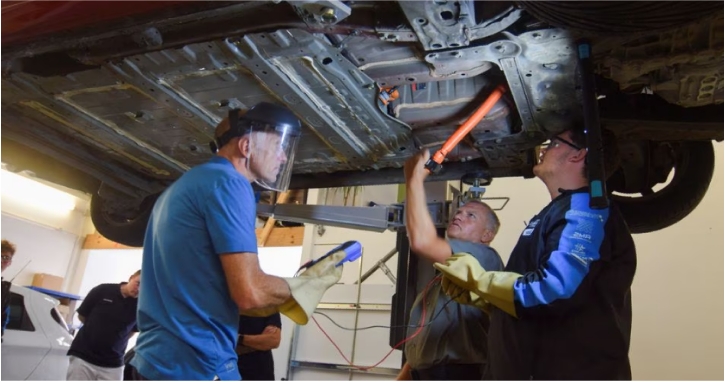
A global shortage of qualified technicians and independent repair shops capable of servicing electric vehicles (EVs) is raising concerns about higher repair and warranty costs for EV owners. This shortage threatens to undermine efforts to reduce vehicle carbon emissions and make EVs more affordable for consumers.
EV Technician Shortage Hinders EV Repairs
Technician training organizations and repair experts worldwide have highlighted the importance of independent repair shops in making EV ownership cost-effective. Independent shops are typically more affordable than franchise dealerships. However, many independent repair shop owners are reluctant to invest in the training and equipment required to repair high-voltage EVs, which can carry 400-800 volts of electricity and pose significant safety risks for untrained technicians.
Challenges for Independent Repair Shops
The challenges faced by independent repair shops include the high costs of equipment, low numbers of EVs on the road, and concerns about safety risks. Roberto Petrilli, an independent repair shop owner in Milan, Italy, expressed reluctance to invest €30,000 in equipment when EV sales are still limited in Italy, and the charging infrastructure is underdeveloped.
Global Shortage of EV Technicians
The shortage of EV technicians is a global concern. The Institute of the Motor Industry (IMI) predicts that Britain could face a shortage of 25,000 EV technicians by 2032, given the country’s plan to ban fossil-fuel car sales by 2030. In the United States, the Bureau of Labor Statistics anticipates a need for approximately 80,000 electrician jobs annually through 2031 to support EV maintenance and charger installation.
Impact on Costs and Accessibility
As the shortage of qualified technicians continues, data from UK used car warranty provider Warrantywise indicates that repair costs for EVs are already rising. A one-year warranty for a Tesla Model 3, for instance, costs more than triple the average warranty for similarly priced fossil-fuel vehicles. Higher insurance and warranty costs could make EV ownership less affordable for consumers.
Addressing the Shortage
To combat the technician shortage, some organizations and foundations are taking action. The Siemens Foundation has launched a $30 million program to train technicians in the United States to install and maintain EV chargers. Additionally, car manufacturers like Tesla are offering training courses for prospective technicians and independent repair shops.
The Road Ahead for EV Technicians
The shortage of trained EV technicians remains a significant challenge for the automotive industry’s transition to electric mobility. Without adequate training and resources, many independent repair shops may hesitate to service EVs, leaving consumers with higher bills and longer repair times. To address this issue, there is a growing need for investment in technician training and subsidies for small repair shops, ensuring that EV owners can access affordable and efficient repair services.
The shortage of qualified technicians poses a significant hurdle to achieving widespread EV adoption and reducing carbon emissions from the transportation sector. Collaboration between governments, educational institutions, and the automotive industry is crucial to address this growing issue and ensure the successful transition to electric mobility.
